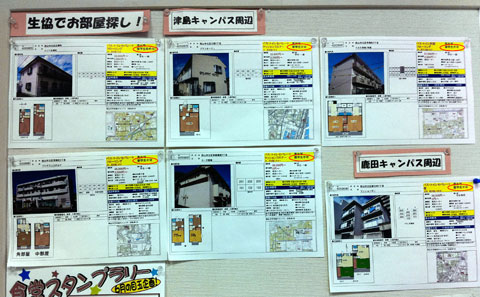Looking for an apartment in Japan can be complicated for foreign students because of the difference in renting system, the language limitation, and the way how Japanese view the foreigner itself.
In the case of Okayama University, if you’re coming alone and this is your first time to Japan, you can ask your professor to enroll you in the Okayama University student dormitory. The monthly rent is cheap, it gives you a community consists of 100% foreigners to start with, and more importantly it gives you time to prepare yourself before actually involved with the Japanese community. Unfortunately, when I wrote this article, there is still no room for family in that student dormitory.
Soon or later, the day when you must look for a common apartment is when the pain starts. Actually, there are several housing companies that provide a furnished apartment, but this is usually expensive and may cost too much for those who want to stay in a long period. In addition, the system adopted by most of the apartments requires you to pay a lot of cash in front. The so-called key money is perfectly linear with the monthly rent, as I will explain below. Extremely cheap apartments are not always a good choice, particularly if the building is old and has poor insulation that makes it hard to get warm during winter; thus you have to spend more energy (and money) to get a proper temperature. These cheap apartments also may have no individual toilet and kitchen as both are located outside of rooms and shared by all tenants. In addition to yachin (monthly rents), some apartments may demand other fees such as environment cleaning fees, the common use of utilities, etc. This fee is usually shown explicitly on the flyer or the contract, so make sure you notice it when you’re looking for a cheap apartment.
If you are planning to look for a casual apartment in Japan, here are a few things that can serve as a knowledge base before you start. This is based on my experience in Okayama, but I believe in general it applies to other regions too.
1. Key Money: Reikin, Shikikin, Tesuuryou
These are the prime reason why you need to prepare a lot of money before renting an apartment in Japan. Reikin is given as a gift to the ooyasan (landlord/owner). The amount varies, but often it is equal to one month’s rent. Shikikin is deposit money which, I think, will stop you from disappearing suddenly without settling your debts. The amount of shikikin can be 1 ~ 3 times of monthly rent, and maybe higher since you’re a foreigner. At the end of your stay, you can have a portion of shikikin refunded to you, but hardly 100% because shikikin is also used to repair the house damage, or at least for the cleaning fee. If the room condition is so tragic before you leave, the chance that the shikikin is not enough to cover the repair cost and you will be charged with an additional sum to cover the rest. So make sure always to keep the room in good shape during your stay. Tesuuryou is a service fee that must be paid to fudousan (housing agency). The amount starts from one month’s rent. I found some people can make a deal with ooyasan directly, and thus bypassing the fudousan. Given such multiplication factors, added with the rent for the first month, most likely that you need to pay 4 or 5 times of monthly rent before even starting to use the room. I heard that the international department of Okayama University can give a loan to foreign students who need to rent an apartment for the first time.
2. Guarantor
I think all apartments require you to have a guarantor. Foreign students usually have their professor to be the guarantor. After all, in Japan, once a professor accepts a foreign student, it is the professor’s responsibility to look for proper housing for the student to stay. Strangely, I found that some professors refuse to act as a guarantor. Maybe the professor doesn’t want to take a risk, but still I consider that the root of the problem clearly lies in the fact that such professor does not trust the student. If this is the case, you can try to consult with the university office that handles foreign students and they may look for someone who can act as a guarantor.
3. Staying period
Most of the apartment requires you to stay for a certain minimum period. Unable to do so after the contract is made may cause a penalty. The penalty can cost one month’s rent. If you plan to stay less than one year, make sure that you discussed it with fudousan or ooyasan. If you’re staying for only three months or less, consider looking for a furnished apartment.
4. Fire insurance
Most of fudousan or ooyasan require you to have insurance to protect you and the room from fire or other disasters. Some fudousan may offer such insurance from an affiliate company, but mostly you’re free to choose any insurance company. Several years ago I noticed that the University Co-op has such kind of insurance at a low price (about half price of common insurance company), so you can try to ask the University Co-op first.
5. Room equipment
Common apartments do not come with furniture, but some provide minimal equipment such as air-conditioner, gas stove, common washing machine, or even internet connection. You should include such thing in your calculation. There is no point to have even a slightly cheaper apartment if you must pay a lot to buy expensive machinery such as air-conditioner. Make sure that you personally look at the room condition before signing any contract.
6. Type of gas
There are several kinds of gas available. If you already got a stove or gas-heater, you need to check if those items use the same type of gas that is running on the apartment that you want. Two most common type of gases are toshi-gas, and LP gas. The LP gas is commonly stored in a big tank that you can see at the backside of a typically old apartment. LP gas is generally more expensive than toshi-gas, so you may want to take this as a consideration.
7. Understanding the room size and type
The room size is commonly expressed with a unit called jyou (畳) based on the standard size of tatami mat. I found that six jyou (6畳) is the most common size for a room. The number of rooms is expressed with a number followed by letters: D, L, or K, which respectively means dining, living, and kitchen. So 1K means you get one room with a kitchen, and 4LDK means you get four rooms, a living room, a dining room, and a kitchen. The 1K is common for single, and the 2DK is common for a small family. The room type generally either washiki (Japanese-style) or youshiki (Western-style). Washiki room has tatami mat flooring, while youshiki room has solid flooring. Toilet type can also either washiki (squat type) or youshiki.
8. Neighbors
Neighbors in Japan are very powerful to determine whether you can stay long in that apartment or not. If your room-neighbors are all foreigners, you are safe. If your room-neighbors are mostly Japanese then beware and be cautious. Most Japanese are not used with foreigners, let alone understand the differences in culture, so their prejudice may not be positive from the start. There are three general things that you need to keep in mind: First, the Japanese doesn’t like to hear any noise, and their decibel limit of tolerance is very low, especially if they’re single or if they have no children. It’s better to keep the speaker inside its box and purchase a headphone. Second, keep clean, especially if your neighbors are living with family. Make sure you know when and how to put the garbage. For example, if you put a broken television in a plastic bag and left it at the garbage station, the television will stay there forever and you may displease the Japanese who also use that garbage station. Third, and the worst, when your Japanese neighbors felt disturbed, most likely that they will NOT directly confront you. Instead, they will tell the fudousan or ooyasan to deal with you while remain anonymous. If you are out-of-control then the fudousan may contact your professor, which will drag the problem even further.
9. Don’t forget that you are gaijin!
Since you’re in Japan, keep in mind that not all apartments accept a foreign student or simply a foreigner. Some apartment flyers even explicitly mentioned that they don’t want a foreign student (click the image below to see what I mean, and notice that it shows ALL flyers on the board located inside a university). No need to stage a protest, just find an apartment that originally welcomes foreign student. If an apartment is open for foreign students, that means the owner is trying to trust the foreigner and you should honor the trust in return.
Some common terms related to apartment
- Ooyasan(大家さん): landlord/owner
- Fudousan(不動産): real-estate agency
- Kasaihoken(火災保険): fire insurance
- Reikin(礼金): gift money
- Shikikin(敷金): deposit money
- Tesuuryou(手数料): service fee
- Keiyakusho(契約書): contract document
- Hoshounin(保証人): guarantor
- Yachin(家賃): apartment rent
- Kinjyo(近所): neighborhood
- Wa(和): Japanese
- You(洋): Western


Thank you for sharing. This is very informational.
Ekstra Ordinary Lukman… At Least I Found You…
who do we contact if are landlord is crazy/ and changing our agreement every time they are bored?